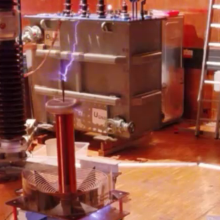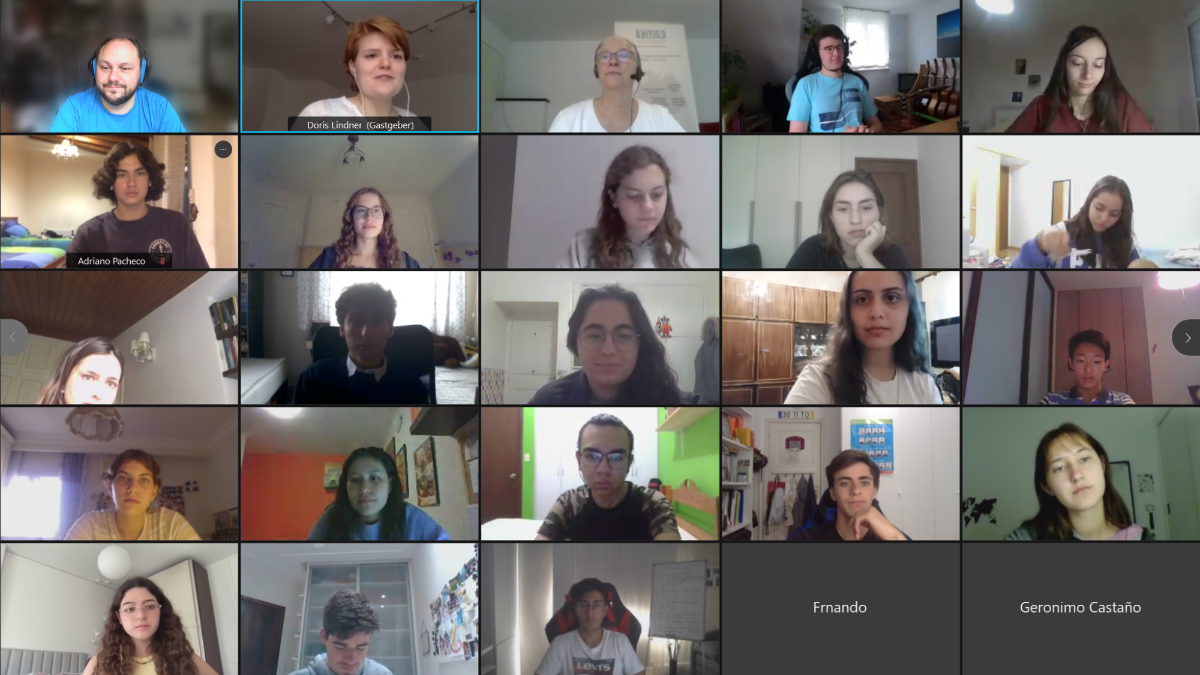Bolts of lightning flash through the dark room, a transformer whirs and a fluorescent tube shines like a laser sword: Laura Barreau demonstrates experiments with electricity to students during the online workshop “Where does the electricity in the socket come from and how much of it is renewable?”. The research assistant is in the high voltage laboratory at the University of Stuttgart. She has set up a Tesla transformer between copper walls sparkling with gold. It is named after Nikola Tesla, who wanted to transmit energy wirelessly. Originally, Tesla wanted to provide ships sailing close to the shore with energy transferred through the air. “The Tesla transformer creates wonderful effects, but unfortunately it can’t be used to transfer energy on a large scale”, says Barreau explaining the device to the students. “Though even so, we can still learn a lot from it.”
What does a sustainable electrical power supply for the future look like? Students Theresa Paulus and Jakob Schroeder spoke with the young people about photovoltaics, water and wind power, biomass, geothermal and planetary energy, and provide an insight into what they are researching as part of their “Renewable Energies” study program. “There is still a lot of need for research to be done by talented young minds”, says Theresa Paulus. She also introduced the student group 'Crossing Borders' [de]. This is a group made up of students from different disciplines at the University of Stuttgart which campaigns for environmental awareness, for example by carrying out educational projects in schools.
The University of Stuttgart leads the way with innovative study programs
Thirty-six students from German schools abroad are being given an insight into the STEM study courses offered by the TU9 universities as part of the STEM Study Exploration Week. “As a member of the TU9 alliance, we are one of the frontrunners in the field of scientific and technological progress. With our innovations and study programs in engineering, some of which are highly specialized, we are leading the way at the cutting edge by setting a good example”, says Prof. Hansgeorg Binz, Vice Rector for Teaching and Continuing Education at the University of Stuttgart. “Interdisciplinary and renowned study programs such as Simulation Technology, Medicine Technology, Renewable Energies and Environmental Science show that those who study at the University of Stuttgart appreciate the combination of cutting-edge research and excellent teaching in a region with one of the strongest economies in Europe.”
The motto of the study exploration week is: “Shaping the future with STEM – YOUR studies for a more sustainable world”. Both TU9 universities put together a varied virtual program for participants, with workshops and lectures on topics such as climate change and robotics among others, tours of the campus and around the city, student counseling and introductions to different departments. Participants are given a virtual tour of the ARENA2036 research campus, where the mobility and production concepts of the future are presented. Participants are also given a virtual tour of a business based on the campus: INERATEC, a spin-off from the KIT, which recycles CO2 to create alternatives to fossil fuels and chemicals. On the part of the University of Stuttgart, the International Office organized the TU9-ING week. In addition to 'Crossing Borders', the MINT-Kolleg and the High Performance Computing Center Stuttgart (HLRS) also prepared exciting workshops and showed the young people, for example, how to run a simulation.
Cuckoos and climate change
How is climate change affecting us? Hans Schipper and Joachim Fallmann, who work at the South German Climate Office at the KIT, show the students that the state of the environment depends on a number of factors being in balance. One example is the cuckoo. “The cuckoo is a migratory bird which flies south in the winter with songbirds and which comes back again in the summer”, says Schipper. While a lot of songbirds navigate by the temperature and what food is available on their journey, the cuckoo finds its bearings based on light. This means that it usually arrives in central and northern Europe at the same time as the songbirds and can lay its egg in the songbirds’ nests. “Because of climate change it’s getting warm earlier in the spring”, explains the scientist. “This means that songbirds are arriving one to three weeks earlier, because they come with the warm weather. Though because the light levels aren’t changing, by the time the cuckoos arrive the songbirds already have chicks. Cuckoos don't get the chance to lay their eggs, and are dying out at our latitudes because they are having to go further north.”
Haze in Singapore and hurricanes in Mexico
An increase in temperature doesn’t just have an impact on the lives of birds, it also makes extreme weather events more likely. Schipper and Fallmann discuss with the students how people perceive extreme weather events such as the heatwave in 2003 or Hurricane Katrina. The young people give their personal experiences. “In Indonesia, parts of the rainforest are often being burnt, and because of atmospheric circulation the smoke spreads to other countries”, explains Kristina in Singapore. “Here we get this horrible-smelling smoke, which is damaging to people’s health. We sometimes have to stay inside because of it, and we had to wear masks even before the corona pandemic.” Extreme weather might often be a bad thing, but it can also be necessary. Adriano from Mexico City explains how people in Mexico need hurricanes for agriculture. “Mexico City and other cities are at high altitude. Without hurricanes these areas would be deserts, like in Peru for example”, says the student. The young people talk with Schipper and Fallmann about how extreme weather events can be evaluated based on criteria such as mortality, economic damage or people's ability to adapt to it. “The important thing is that we keep learning from one another”, says Fallmann.
TU9, the alliance of leading technical universities in Germany, has held the 11th ‘STEM Study Exploration Week’ for students at German schools abroad all around the world who are interested in studying a technical or science-related subject in Germany. Since 2019, the Study Exploration Week has been held every year at two different TU9 universities in parallel. It is open to all students in the 11th and 12th grades. The requirements for those who wish to take part include very good grades in STEM subjects as well as in German – and of course a special interest in technology and engineering. The TU9 Study Exploration Week is co-financed using funds from the Federal Foreign Office as part of the BIDS program organized by the German Academic Exchange Service (DAAD).
International Office
- Further information
- +49 711 685 68566
- Write e-mail
- Open office hours at the IZ: Monday & Wednesday 2-4 p.m., also on Tuesday & Thursday 10-12 a.m. during March-April & September-October





